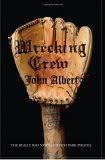
In Wrecking Crew, drug abuse, filth, rock star excess, sexual deviance and other depravity meet. . .baseball? Yes, baseball. The all-American pastime of baseball wedded to the grungy lives of marginal no-hopers and also-rans in the sun-bleached boneyard of LA. Sounds like a great plot for a novel, doesn’t it? Only, the characters and incidents in this book are real and John Albert doesn’t try to make them out to be anything more or less than what they are. The book is not purely a memoir either; it’s not just Albert’s story told from his point of view. There are interviews with all the major characters and they get to explain, justify, and comment on the events in the story. In fact, Albert won the Best of the West Journalism Best Sports Writing Award in 2000 for an article from which this book is derived.
The book opens with Albert’s story: his junkie past, his gone, but not forgotten glory days as a drummer in a couple of LA punk bands and his not-so-bright future as a bottom-feeding screenwriter. He then proceeds to describe the histories of all his teammates, trying to make clear their motives and hopes as they find themselves almost compelled to join an adult baseball league. There’s Mike Coulter, the dynamo behind the team; a rock guitarist, whose band Lifter has reached the end of its rope; he’s strung out, trying to kick heroin and he sees baseball as a way to escape the deep, dangerous rut he’s in. There’s Johnny Navarro, a close cousin of Dave Navarro (guitarist in Jane’s Addiction), who has the misfortune of living near fame and fortune; he also has an extremely addictive personality - mostly for drugs, gambling and completely-wrong-for-him women. There’s Clay Jefferson, one-time bassist with the hair-metal band Junkyard, whose promising career of riches, fame and free drugs was washed away in the Shibboleth that was Nirvana; now he’s just another has-been, ex-junkie, scraping by in LA.
There’s plenty more characters – all of them compelling for their own, often sad, reasons. Most of them don’t fit into the hard-working, blue-collar milieu of the league. They live in the rarefied atmosphere of LA, where “anything short of completely realizing one’s dreams was somehow viewed as complete and utter failure”. They’re all has-beens or never-beens. They’re not even the horses the royalty rides up the mountain; they’re the mules, packing all the shit. For the most part, they work crummy jobs on the periphery of the music or movie business – chauffeurs, gardeners, scenic artists (i.e., people who carry props). They no longer care about what they do; they don’t even remember what they did it for. Here’s Mike, the songwriter, and his moment of discovery of what’s really important: “I realized that the only thing separating me from that whole world was money and nothing else…As long as you were able to pay, it didn’t matter who you were. Before that, I thought there was more to it.” It’s true, in a way, but for someone striving to be an artist, it’s a deadly way to see the world. When it’s no longer about your art, it’s just inertia dragging you those last few feet forward before you come to a complete stop.
Baseball becomes their escape. It’s retrogression, of course, but that’s not necessarily a bad thing. Albert describes one of the teams they play against as “(b)arely in their twenties, many of them already sported moustaches and had children. Most of us were decades older and still living like teenagers”. And while it’s true that they may have lived like teenagers, it’s equally true that they were no longer teenagers. Could they have felt at all the innocent forward energy of youth? All the drugs and the mess they’d made of their lives must have started to pall. Baseball was a trip back in time to their youth; before drugs and rehab and squalor swallowed up their lives. The question the book asks is: can baseball save you? In some cases, yes, while others fall by the wayside as they go off the rails and get lost in labyrinth-like morass that is LA. Fortunately, the baseball team is a beacon; a light in the window for these lost travellers to which, hopefully, one day, they can return.
Though the book deals solely with the events leading up to the team’s creation and its first year in the league, the final chapter details what became of the team members. The good thing to know is the Griffith Park Pirates are still going strong.
Like the narcotics that fill the lives of its characters, this is one highly addictive read. John Albert has a spare, matter-of-fact style that draws us into his story and no matter how disturbing it might get – and, believe me, it gets mighty disturbing – we don’t feel we have to avert our eyes. Albert is so sympathetic to his characters that we feel their pain and understand the horror they bring into their lives.
I can’t honestly say that I read this book in one sitting – it was more like in one lolling, as I was lying on the couch when I read it. I can, however, state that it was unputdownable. Of course, I could have said that it was a real page-turner, but that doesn’t quite roll off the tongue like “unputdownable”.



No comments:
Post a Comment